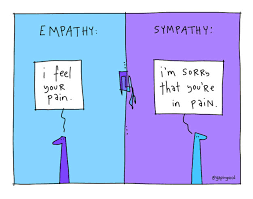Have you ever gone to offload to a friend or family member and found yourself feeling annoyed by their apparently sympathetic response but not being sure quite why? Or perhaps you have put your finger on it and felt they simply wanted to offer you solutions but you wanted to talk about how upset you were? You knew what the solutions were, you just didn’t want to embrace them yet.
A common difference between both partners in a couple is the need or capability for empathy. The dictionary defines empathy as “the ability to understand and share the feelings of another”. This is an importance part of human connection and when done well can create an understanding and closeness between the two (or more) people having the conversation. It can be an important step in encouraging someone to share something that they’re struggling with. It applies to children and adults alike.
Yet there can be situations where this important step is overlooked. You might be in a hurry; you might not be terribly interested in what you’re being told; or you might have negative feelings towards the person who is trying to tell you something. Have you noticed how this can change the tone of the conversation? It doesn’t become so close. The person trying to grapple with explaining something becomes upset or clams up, or simply leaves to go elsewhere. Shortness or irritation in place of empathy can snuff out the flame of a meaningful conversation.
As too can moving towards offering solutions too quickly. You may recall a time when someone shared an issue with you. Something had upset them, or they were finding a situation troubling. You immediately suggested some solutions you could think of but this didn’t seem to assist. In fact they seemed to close down a bit, or rejected your solutions outright before even considering them. It could be that they wanted some empathy rather than suggested solutions. Perhaps they were not ready to think about solutions yet – sometimes people simply want to feel that their feelings have been witnessed and understood. They want the person they’re talking to to recognise how they’re feeling. They may be able to find their own solutions or they may move to asking for help finding solutions later on in the conversation.
How can you know when someone wants empathy and when they want solutions?
The mediator take on this is that it’s rarely wrong to be empathetic. The person may move you along to talk about solutions if they are impatient to look at this but they are unlikely to be upset by your empathy. Conversely moving to look at solutions too quickly can end the conversation more abruptly without even moving to solutions. If you’re not sure then ask the person “would it help to look at solutions” or “do you want to talk about potential solutions or do you feel like that wouldn’t be useful right now”.
What does empathy look like?
- You seem really upset.
- I feel like you’re confused – is that how you feel?
- I can see that that made you really angry.
- It can help to make eye contact with the person.
- Your tone of voice can also convey how you feel and a softer tone can help the person feel you’re being empathetic.
This graphic neatly explains the difference between sympathy and empathy
Why could this be important in a separation?
Firstly, because if you’re having difficulties in your relationship then understanding empathy and being more empathetic could help to iron out some of the issues. It will certainly help you to talk about what you each see as the issues and to create greater closeness whilst you share how you each feel. Relationship counselling may also help.
If you have already separated from a partner then seeking to understand the way they feel can be a big step forward in the relationship between the two of you. You may be mystified and bemused as to why your ex-partner feels the way they do. You may wonder how you can both have been part of the same situations when you hear how differently they feel about things. But asking each other to justify the way they feel is rarely a recipe for constructive discussion. Instead seeking to understand how you each feel and acknowledging each other’s feelings in an empathetic way, without asking each other to justify their feelings, can be game changing. Empathetically acknowledging – in a meaningful way – that you can see your ex partner feels hurt/upset/angry (even if you really don’t see WHY they feel hurt/upset/angry) really can take your discussions off in a completely different more positive and peaceful direction.
If you’re not sure if you believe us why don’t you start practising this skill and see what happens? You can start with someone you’re close to like a good friend or family member and see what effect empathy has on the conversation. If you can notice a difference then try using it in other conversations. Understanding co-workers and demonstrating empathy can be a useful skill in the work place so that’s a good place to start. If you continue to see benefits then try using it in conversations with your ex partner. You may find they are confused by it at first – especially if this is at odds with the view they hold of what kind of person you are from the relationship. But over time you may find it can dramatically improve the relationship between the two of you.

